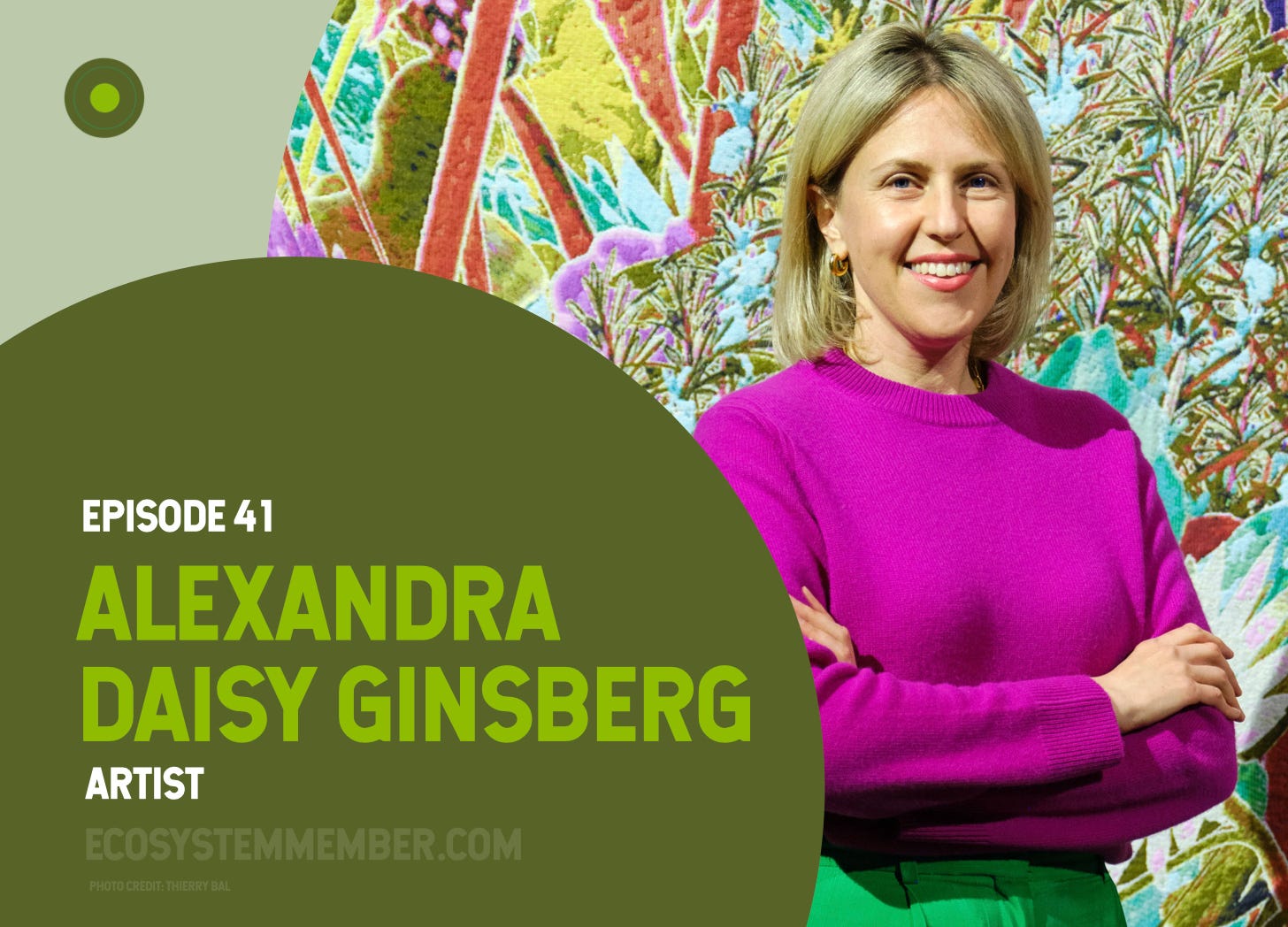Ep 41 / Do pollinators like art? with Alexandra Daisy Ginsberg, Artist
Daisy gives viewers a sneak peek of her new tapestry that will feature in the Design Museum's upcoming 'More Than Human' exhibit.
Instead of responding to a commission from The Eden Project in Cornwall for a sculpture about pollinators, this week’s podcast guest artist Alexandra Daisy Ginsberg asked the question - what would a sculpture for pollinators look like?
That question - like her start in art - led to a long list of other questions:
Do pollinators even like art?
What is art in the world of a pollinator?
What do pollinators see when they see art?
What kind of emotion or reaction can art elicit in pollinators?
The response, which isn’t really about being a definitive answer as much as another question, is Pollinator Pathmaker.
Using a an empathy algorithm she created and optimized for diversity, Daisy developed a tool to build editions of what we would call gardens that are designed for the pleasure of plants and pollinators rather than the aesthetic pleasure of humans.
As you’ll hear in the episode, the Pollinator Pathmaker project has editions in the UK and Europe, as well as an online tool at pollinator.art where you can create your own edition suited to your local conditions and pollinators. The latest manifestation of the project from Daisy arrives in the form of a tapestry (which you can get a sneak peek of in the video for this episode) in the Design Museum’s “More Than Human” exhibition (curated by last week’s guest Justin McGuirk) that opens on July 11.
In addition to Pollinator Pathmaker, this episode also covers some of Daisy’s past work including her exploration of “better” for her PhD thesis, “Resurrecting the Sublime” which resurrects the smell of a flower driven to extinction by humans, and “The Substitute”, a digital recreation of the last male Northern White Rhino (who once joined Tinder).
As we explore this work we get into some of the underlying questions around more than human creativity and art, non-human animal consciousness (including the work of Lars Chittka) and the often destructive role humans play in the ecosystems we all exist in.
If you enjoyed our episode with Lucia Pietroiusti, head of ecologies at the Serpentine in London, this episode is a can’t miss.
Thanks for listening -
Rick
Watch/Listen to the Episode
What We’re Reading
This Vermont Soccer Team Plays for the Planet from The New York Times - At some point in my mid-twenties I more or less gave up on sports. I wasn’t playing them like I did as a kid and attending professional sporting events, in the US at least, became prohibitively expensive. (I still took in the occasional football match on trips to England and Japan, where the costs were a bit lower.)
These days though, there’s a new strain of sports team emerging. One that looks more like a connected part of an ecosystem and less like an untouchable, expensive entertainment experience. Bohemian FC in Dublin, Ireland is a member-owned club with a Climate Justice Officer who is asking why can’t the community club also own a solar array or retrofitting business?
The New York Times recently profiled Vermont Green FC, which despite its amateur status is fully professional as an environmental actor. Fans can partake in lower footprint vegan food at matches, volunteers sort the recyclables at the end of each match, and fans who bike to the match are entered into a prize raffle.
Glastonbury unveils "first-of-its-kind" mycelium-insulated stage from Dezeen - Last weekend at the Glastonbury music festival a dance music tent featured a ‘Sunflower Sound System’ with panels grown from hemp and mycelium. Fossil fuel-free and entirely compostable, it also promises a great music experience thanks to mycelium’s “sound absorbing qualities.”
Inside a Woodland Home Built Over Water to Become One With Nature from Architectural Digest - Dream home alert in Oregon from architect Jim Cutler. Built over an old logging pond, this home aims to integrate with its surroundings rather than dominating or harming the other members of the ecosystem. In this video tour of the beautiful home he designed, Cutler talks about the obligation we have to know a place when we choose to dwell there.
The World Is Producing More Food than Ever—but Not for Long from Wired - “For every degree Celsius of warming, global food production is likely to decline by 120 calories per person per day,” according to a new research paper in the journal Nature.




